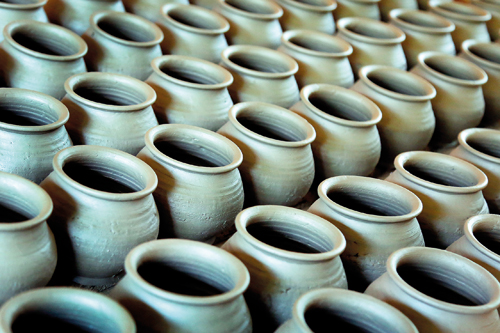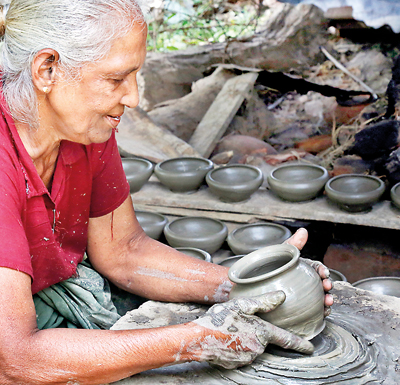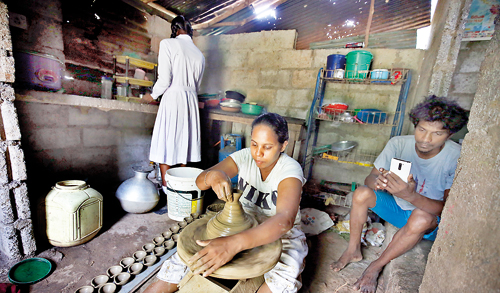Pot on for the season
 It’s that time of the year when we look back nostalgically at the traditions of the past mingled with bright hope for the future. Families get together to celebrate the dawn of a new year and take part in performing traditional customs and rituals. Of these, boiling a pot of milk can easily be identified as one of the most important rituals in the Sinhala and Tamil new year calendar.
It’s that time of the year when we look back nostalgically at the traditions of the past mingled with bright hope for the future. Families get together to celebrate the dawn of a new year and take part in performing traditional customs and rituals. Of these, boiling a pot of milk can easily be identified as one of the most important rituals in the Sinhala and Tamil new year calendar.Given the scale of celebrations, there are trades that thrive during the Avurudu season. For the ritual of boiling milk, the clay pot and clay stove are essential.
Pottery is a traditional craft which goes back centuries. In the days of yore, this was the preserve of the Potters Caste (also known as the Badahäla caste).
Weerangula is a village in the Gampaha District that houses a community that even today continues this trade, although they have diversified to produce other items apart from pots- clay lamps, clay stoves and flower pots for growing orchids. Naturally the pots to boil milk and the stoves are the bestsellers during the Avurudu season.
Alice nona started doing pottery when she was 20 and now at 65, says she is unable to turn out as many as she used to. With the younger generation choosing alternative employment their production is limited and so business is less profitable, she says regretfully.

Expert touch: Alice nona shaping the clay
But for M. Nirmala Krishanthi who makes a living out of producing little clay oil lamps targeting the Vesak market, it’s a profitable business. She has been engaged in the craft since childhood and is now teaching her children the art of pottery making.
The Weeragula Crafts Training Centre functioning under the National Crafts Council, provides equipment and space that is needed for craftsmen of the village to produce clay goods. The centre consists of traditional manual wheels, potter’s kick wheels and electric-powered potter’s wheels.
Priyanka Chandani who has 25 years experience as a potter says this is an independent trade where they don’t have to work under anyone. Apart from seasonal products, they undertake orders for products like orchid pots and can turn out around 200 milk pots a day. The children of the family aren’t willing to continue her trade even though it’s more profitable than being a three wheel driver or working in a garment factory.
The trainer and officer in charge at the Weeragula Crafts Training Centre, Nalika Amarasekara highlighted the daily challenges faced by the craftsmen of her village. The lack of craftsmen has made it difficult for the centre to supply goods in order to meet the demand. Although the village has a machine that prepares the clay for shaping, many are reluctant to exert the amount of manual energy that needs to be put into the preparation. There are only 2-3 craftsman who visit the training centre regularly.
Further, laws restricting the extraction of clay and soil in the Gampaha district have made it difficult for craftsmen to acquire the raw material. In spite of the fact that the industry generates a comfortable income in the Aurudu season, the earning is not consistent throughout the year. Clay goods cannot be produced during monsoons as it lacks required sunlight to dry the products before they are fired in a kiln.

Nirmala Krishanthi hard at work in her home and above- the clay pots ready for sale. Pix by M.A. Pushpa Kumara
The Weerangula pottery craft training centre, which is almost 70 years old, is one of the 16 pottery craft training centres established islandwide by the National Crafts Council. Assistant Director (Provincial) Crafts and Training Division of the NCC, P. A. Jayasinghe, says it is normal for such training centres to have fluctuating numbers of trainees and craftsmen. The regular solution to this would be to introduce a new craft to the training centre. Yet, since Weeragula is a village of traditional potters, this mechanism cannot be implemented in this case, he said.
The Weeragula craft training centre functioned under the Sri Lanka Handicrafts Board prior to 2008. But as it was a loss making institution it was brought under the National Crafts Council in 2009.
In addition to the skills training provided by the centre, the trainees are also instructed on pricing of products. After the price is agreed, an additional 10% is added which is the payment that goes to the maintenance of the Crafts Training Centre. The Centre is also able to provide loans to craftsmen to buy the required raw material and the loans are repaid through a system of sale based payment.
As another Avurudu season passes, one wonders how much longer traditional craftsmen like the potters of Weerangula will be able to work their trade.


